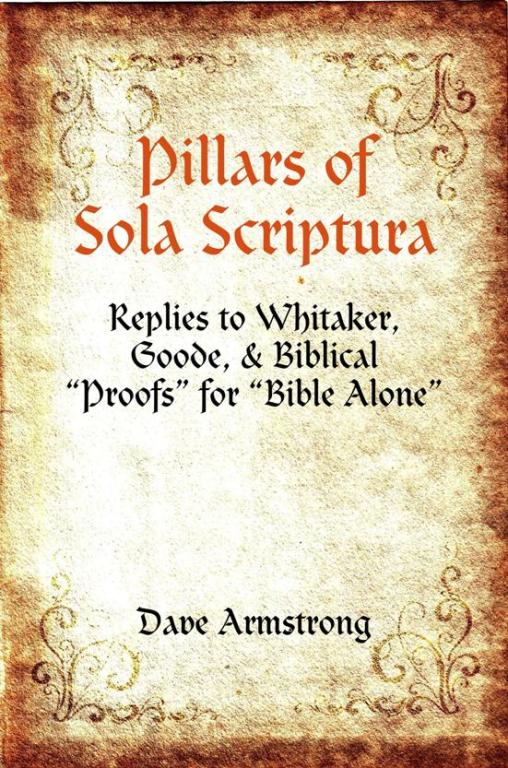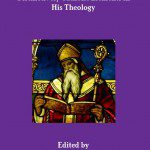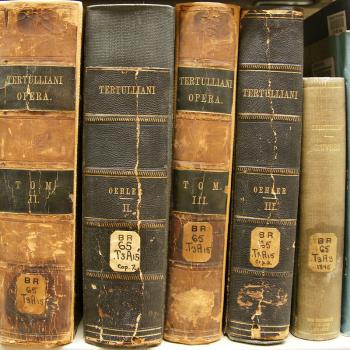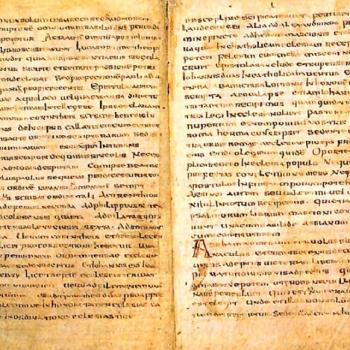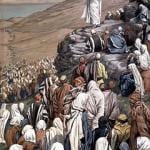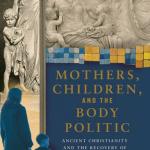[cover design by Dave Armstrong]
Sola Scriptura (literally, “Scripture Alone”) is the Protestant rule of faith; that is, the only supreme, final, and infallible authority for all matters related to the Christian faith. It follows logically that both an infallible Church and an infallible apostolic tradition are thus rejected and ruled out.
The concept of sola Scriptura is not, however, inexorably opposed in every way to the importance and validity of Church history, tradition, ecumenical councils, or the authority of Church fathers and prominent theologians. The difference lies in the relative position of authority held by Scripture and Church institutions and proclamations. For the Protestant, the Bible alone is infallible and the Church, popes, and councils are not.
Sola Scriptura is considered one of the two “pillars” — along with sola fide, or “faith alone” — of the Protestant “Reformation” (or more accurately, Revolt) of the sixteenth century. It’s fundamental and essential in Protestant thinking with regard to the all-important issue of Christian authority and determination of true theology.
Whereas Protestantism takes an “either/or” approach with regard to these issues, Catholicism has a “both/and” perspective. Thus, Scripture and Tradition are inextricably linked: twin fonts of the one spring of revelation (a word-picture that the Catholic Church has often used). Tradition is the handing on of true beliefs and practices by oral as well as written means.
The Bible, though uniquely inspired, is part of a Tradition larger than itself, of which it is an encapsulation or crystallization. Scripture, Tradition, and the Church, in the Catholic view, have been described as a “three-legged stool.”
If sola Scriptura is a doctrine about the authority of the Bible, which makes the Bible alone infallible, does it follow that the same Bible should be fully expected to expressly, plainly teach it in its pages, or stronger yet, that it necessarily would have to do so? Or is it plausibly true without the Bible ever asserting it (not even indirectly)?
Most Protestant defenders of Scripture Alone contend that it is taught in the Bible. I maintain that their alleged prooftexts are invariably logically circular and fatally weak (and I hope to prove that in this book). Other Protestants argue that it is a true and a solid principle, without having to be directly taught in the Bible; that it isn’t logically necessary for that to be the case in order to adhere to sola Scriptura.
I have made many and varied elaborate arguments through the years against both of these positions, and many will be presented in this book, as I respond to the arguments of some of the most able and renowned champions of sola Scriptura over the last 500 years.
I will offer up rebuttals in this book to significant biblical arguments that actually deal with the heart and stated definition or essence of sola Scriptura: the notion that only Scripture is the sole infallible guide for the Christian: to the exclusion of an infallible tradition or infallible Church. I won’t be responding to arguments for inspiration or material sufficiency or other relative side issues, because Catholics already agree with those.
My purpose is to demonstrate that the defenses of sola Scriptura (particularly from the Bible itself) are inadequate, and indeed, utterly fail in their task. I argue, moreover, that if indisputable biblical evidences for the position can’t be found, it collapses in a heap of self-contradiction and logically self-defeating propositions (even before one analyzes other aspects of it).
In other words, the foregoing is a fancy way of saying that sola Scriptura (fully and closely examined) simply doesn’t make sense, and often reduces to literal nonsense. I mean no disrespect whatever to my Protestant brethren in asserting this, but it is my conclusion based on a long and serious study of the topic. A person is not the same as his opinions and ideas, and every person ought to subject his or her own opinions to logical scrutiny, and be willing to forsake them if they are found seriously wanting.
William Whitaker (1548-1595) was a Calvinist Anglican apologist and Master of St. John’s College, Cambridge. His masterwork was Disputation on Holy Scripture: Against the Papists, Especially Bellarmine and Stapleton, published in 1588. I have utilized an online copy published in 1849 by the University Press of Cambridge.
James R. White, a zealous Reformed Baptist apologist and prominent defender of sola Scriptura, has sold the book on his website, and wrote about it in one such ad in 2007:
Since the Reformation, only a few godly servants of the truth have invested the time and effort necessary to produce for God’s people a full-orbed defense of Scriptural sufficiency against those who would subject Scripture to external authorities. William Whitaker was one of those servants, and his work should be carefully studied by all concerned shepherds of Christ’s flock.
William Goode (1801-1868) was an English evangelical Anglican, a priest, and Dean of Ripon after 1860. He wrote The Divine Rule of Faith and Practice, originally two volumes in 1842, and then revised and enlarged to three volumes in a second edition in 1853: published in London by John Henry Jackson (vol. 1) and Hatchard & Co. (vol. 2).
It is considered by many Protestants to be the best defense of sola Scriptura ever penned. For example, Pastor David T. King, an active Presbyterian apologist, wrote in his own similar book, A Biblical Defense of the Reformation Principle of Sola Scriptura (Battle Ground, Washington: Christian Resources, Inc., 2001):
. . . of all the treatments dealing with sola Scriptura, the work of William Goode, The Divine Rule of Faith and Practice, has never been surpassed. (p. 17)
I have utilized online versions of the first two volumes [one / two] (the third not presenting any purely biblical argumentation).
Classic Protestant apologists like Whitaker and Goode believed in their doctrines strongly enough to defend them at great length and in fine details, rather than merely accept truths in blind faith, sans any significant argument, like so many Protestants today, or to assume that no one can be certain enough of theological truths to vigorously defend them.
Like these “old guys” or not, we can heartily respect them in this respect. They stood for something, and zealously fought for it. There is nothing wrong with placing very high confidence in Scripture: it is only the unbiblical notion of sola Scriptura that causes problems.
I shall also reply in this volume to additional Protestant arguments (mostly biblical ones) in favor of sola Scriptura, from various sources. May the reader judge the validity of the various positions pro and con. This is the beauty of dialogue, in which each person’s views are fully presented, rather than opposing views being described by opponents (with all of the usual bias – intended or not — inherent in that).
*
TABLE OF CONTENTS
*
1. General View of Patristics; Tertullian, St. John Chrysostom, and St. Augustine; St. Athanasius on the Old Testament Canon (p. 13)
2. Relation of Church and Scripture, and the Practical Necessity of an Authoritatively Declared Canon (p. 29)
3. Is Scripture Completely Self-Authenticating and Self-Evidently Inspired in All its Books, so that Each Individual Can Discover the Canon in Isolation from Church Pronouncements? (p. 45)
4. The Perspicuity (Clearness) of Scripture (p. 59)
5. Church Fathers on the Rule of Faith / Prooftext for Perspicuity (Eisegesis of Deuteronomy 30:11-14) Refuted from Scripture (p. 75)
6. Biblical Refutation of Whitaker’s Eisegetical “Prooftexts” for Perspicuity from the Scriptural Metaphor of “Light” (p. 87)
7. “Plain” Gospel and Easily Understood Biblical Christology?; Typology and Analogies to Moses, Joshua, and the Judges (p. 95)
8. Moses’ Seat, Pharisaical Authority, the Jerusalem Council (Acts 15), and Whitaker’s Irrational, Radically Individualist Subjectivism (p. 115)
9. Church Councils, St. Irenaeus’ Rule of Faith, and St. John Chrysostom on St. Peter and His Successors (p. 121)
10. More Logically Circular Subjectivism and “Co-Opting” the Holy Spirit as the Supposed “Final Judge” for All Interpretation Disputes (p. 131)
11. The Nature of Tradition(s), the Immaculate Conception; Gregory the Great and Nicaea II on Images (p. 135)
12. Is All of Jesus’ Teaching and Apostolic Tradition in Scripture?; Authoritative “Necessary” Extra-Biblical Tradition (p. 145)
13. The Protestant Perspective on the Church Fathers (p. 157)
14. Oral Tradition / Desperate Anti-Traditional Exegetical Arguments / St. John Chrysostom on Tradition / Whitaker’s Near-Bibliolatry (p. 161)
15. Further Rebuttals of Whitaker’s Absurd Attempted Biblical Arguments Against Apostolic Tradition or Any Tradition Whatsoever (p. 173)
16. Definitions and Premises; Ezekiel 3 (p. 187)
17. Goode Concedes: The Bible Contains No Precise Statement of Sola Scriptura; the Rule of Faith of the Old Testament Jews; Jesus and Tradition (p. 201)
18. Oral Tradition in the New Testament; Church Fathers and Tradition (p. 215)
19. Goode Denies the Infallibility of the Church; Is the Bible Its Own Judge, Minus the Church? (p. 225)
20. Perspicuity (Clearness) and the Self-Defeating Nature of Goode’s Logic and Standards for All Doctrines (p. 231)
21. Reply to David T. King’s Defense of Sola Scriptura from Romans 16:15-16 and 2 Timothy 3:16-17 (p. 237) [read online]
22. Reply to the Arguments of a Book Review on Amazon (Regarding Galatians 1:6-9, 2 Timothy 3:14-17, and John 20:30-31) (p. 249) [read online]
23. 2 Timothy 3:14-17 and “Catholic” Implications of the Phrases “Man of God,” “Profitable for Teaching,” Etc. (p. 259) [read online]
24. How Different (In Nature and Ultimate Effect) Are “Solo” Scriptura and Sola Scriptura? (Reply to Keith A. Mathison) (p. 267)
25. The Bereans “Searching the Scriptures” (Acts 17:10-11): Proof of Sola Scriptura? (p. 297)
26. No Theological Certainty?: The Biblical Understanding of “Truth” vs. “Essential” and “Secondary” Doctrines (p. 301)
Last updated on 3 June 2023


